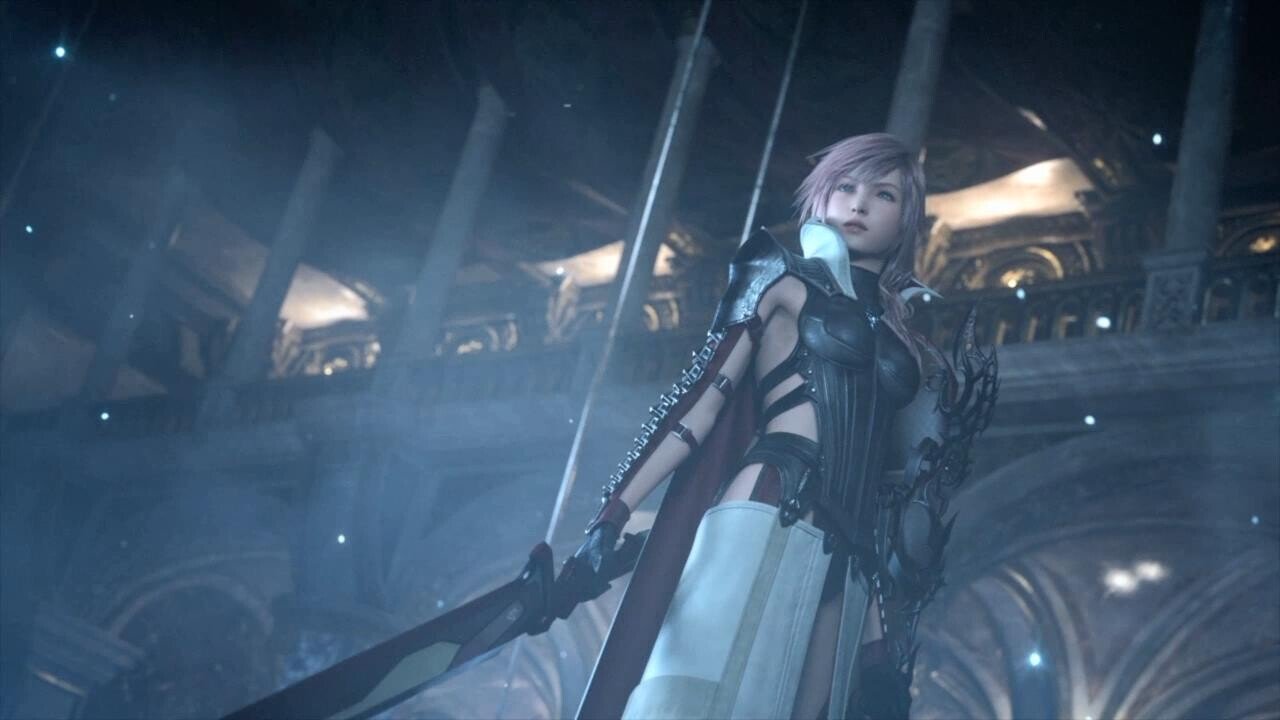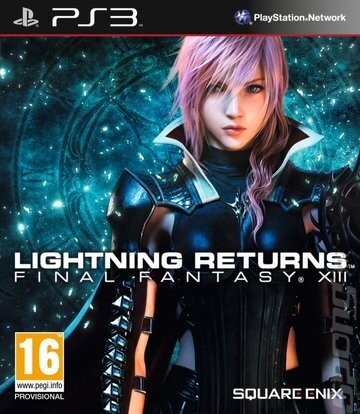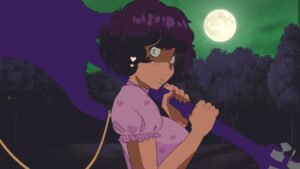For the first time in a console generation Square-Enix has broken with tradition and released three consecutive Final Fantasy games that take place in the same world, with the same cast. In theory, this seems like the framework for a great epic, with each game building on the foundations of the previous title. Instead, what we have is a fragmented, divisive game that epitomizes the desperation of Square-Enix during the previous console generation.
13 Days To The End
If that all sounds confusing and unrelated with what has come before, that’s because it is.
The story of Lightning Returns: Final Fantasy XIII is stretched to the breaking point at best, and utterly nonsensical at worst. Like FFXIII-2 before it, Lightning Returns brings a whole new mythology and world that somehow manages to drag previous characters into it with no convincing explanation. Because of the cataclysmic events in FFXIII-2, the survivors of the land are now immortal, and the world has been in decline for 500 years. Chaos, a catchall term for “bad stuff that corrupts people and does other things as/when the plot requires it” is swallowing up the world, and there are only 13 days left until the end of all things finally comes. Lightning, the central character of the entire series, is now a demi-goddess figure known as “The Savior” who has been appointed by a god, Bhunivelze (pronounced “boo-ni-vel-za”), to redeem souls, and it is her job to travel through what remains of the world, collecting these saved souls. In return, her sister, Serah, will be returned to her once her job is done and a new world is remade, or so Bhunivelze promises.
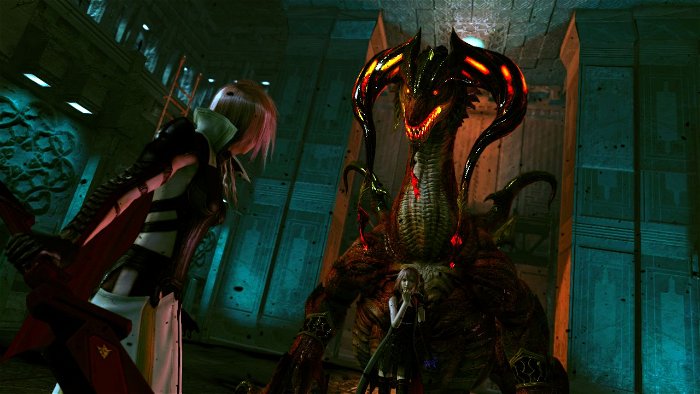
****
All of this is wrapped up in the aging Crystal Tools engine, which is clearly at its limit. The frame rate regularly stutters, and textures often look blurry and indistinct up close, a trade off of the more open, less linear environments the game takes place in. The sound is good, but quite a bit of it has been recycled from both FFXIII and FFXIII-2, so while no one is going to complain about a good, rousing, orchestral score, when that score is five years old it’s hard to get excited.
On the other hand, for fans of systems, there’s a lot of interesting stuff going on.
The Play’s The Thing
Lightning, Hope and all the rest are barely human, expositing on plot points and pseudo-theology with all the engagement and charm of a dead cactus.
Where Lightning Returns story tries to dance into your heart and ends up sliding on a banana peel straight off the building, the gameplay attempts many new and challenging things.
One of the oddest concepts to get your head around is the concept of time. Rather than the silly, time-traveling escapades of FFXIII-2, Lighting Returns has a countdown to the end of the world. The plan is for the world to end at the appointed time, 13 days from the start of the game, but the time allotted to the player is actually shorter than that. Lightning gets more “time,” by completing main story and side-quests. The kicker here is that there’s a real clock ticking, except during combat, and cutscenes, counting down about a minute of “game time” per real second. At six a.m., game time, Lightning is pulled from whatever she’s doing and is returned to the “Ark” her base of operations, while the game tallies up how many quests she’s performed, and either grants more time, or forcibly moves the calendar ahead one day.
This creates an interesting tension where time management is essential; players MUST juggle between side-quests for character advancement and the main story quest in order to actually save up enough “time” for the game to run its full 13 day countdown. It adds an urgency to the game that most RPGs lack, and it means that most players—unless they resort to a walkthrough on their first game—will likely not be able to do everything the game offers as they madly dash about trying to meet deadlines
***
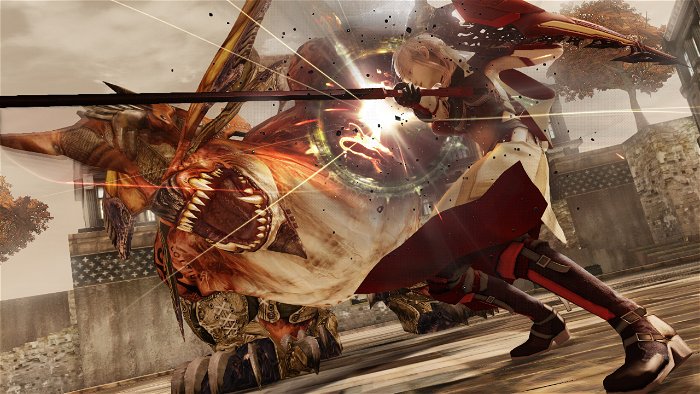
As is usual for an FF game, there’s been a drastic overhaul of the systems, particularly the battle system. Unlike traditional JRPGs, Lightning Returns is a solo affair, with Lightning fighting primarily by herself. Occasionally guest stars will join in the fray, but usually Lightning herself is taking on the FFXIII roles of Ravager, Medic and Commando roles established in the previous games. The game manages this trick by introducing “Garbs,” which is essentially a return of the dress sphere system from FFX-2, where switching outfits brings new stats, weapons and abilities to use in battle. Now, however, the trick is that players must manage this all with just Lightning.
FFXIII-2 went off the rails with its plot, but Lightning Returns is the smouldering crater this story finally crashed and burned into.
This translates into one of the fastest paced combat systems in a JRPG in recent memory. By using the shoulder buttons, players can quickly change back and forth between different outfit sets, seamlessly changing from magic to melee and something in between. In addition, individual skills can also be customized to outfits. This, combined with the almost RTS feel of combat, makes for a battle system that demands both quick reflexes, quick thinking and elaborate pre-battle preparation. It discourages brute force button mashing in favor of measured, strategic thinking, and people who rely on spamming only one attack will die very quickly.
And here’s where Lightning Returns separates itself from contemporary games. It is HARD. Even the “Normal” difficulty level would be considered hard by today’s standards, sitting closer to the ruthless difficulty of Shin Megami Tensei III: Nocturne than the ridiculous ease of the original FFXIII. This is an old school JRPG, similar to the Souls series, in that the only way to succeed is to master the game’s systems. The RPG nut that enjoys tinkering with different skill configurations, coming up with optimal weapon/skill sets will enjoy this game. People that want to bash things will get shut out quickly and quit from frustration.
In the end, Lightning Returns is a game that feels almost as if it were done by two different teams. The team that designed the gameplay did something bold and experimental, resulting in a challenging game of strategy, time, and management that surprises and engages. The team that created the story and characters floundered in the narrative mess of the past two games, tying it all up in an unsatisfying conclusion. At least we can now close the book on this storyline. Hopefully Squenix will return to new stories with every FF game in the next generation.
*To read the full review, pick up the digital only edition of CGMagazine Available on mobile and digital download
